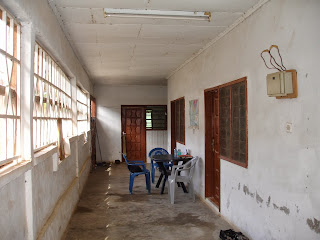Picture a brand new 15 seater minibus. Now give this 20 rounds in your washing
machine with a sack of rocks and imagine the result. Ok! You now have more of an image of your
average tro tro: dented, rusty, chipped windscreens, badly fitting doors,
wobbly seats, slashed upholstery, shattered suspension, an engine that just
about works. I could continue but I
think you get the idea.
Picture a newly laid road, smooth and glossy, stretching like
a glistening heat wave into the distant horizon. Now get real and pop your road in the washing
machine with the bus and the rocks; cracks, mountainous holes, caked in dust…
to name but a few of the hazards!
Picture a cool, air conditioned, empty tro. Now…remember how you can barely get in the car
in England on a hot day? Expand your
image to include the relentless equatorial sun beating down and you are getting
much nearer the mark.
Now, you + husband and at least 17 (yes, I know it’s a 15
seater!) more Ghanaians of all different shapes and sizes pile in loaded down
with bags and animals (alive and dead) and babies and any other parts of the
kitchen sink you may need on the way.
Oh, and don’t forget the mobile phones with which you can communicate
very loudly and very often. Also hear
the wide variety of peripatetic tro sellers vying for trade all around you.
The scene is set – well, almost. Did I mention the large, large roof rack
crammed with goods from fridges to goats? (I did actually see a whole herd of
goats strapped onto one roof rack but I didn’t manage to get the all important
photo).
So, off we go, 30 miles, 1 hour, to Bolgatanga.
There are two ways with which you can regard this journey:
1
The White
Knuckle Ride of a life time:
Swerving to avoid the voluminous
potholes, crashing down and out of the ones you can’t avoid; careering across
to the other side of the road to grab the smoother bit before the next man,
narrowly avoiding the incredibly large and laden lorry looming near or the
small motor bike heading straight for you; waiting patiently for the armed
guard to take you past “the highwayman” who once upon a time held up a tro (to
be fair, you only have to endure this one after dark); driving in zero
visibility due to the enormous quantities of dirt and dust thrown up by all
the charging around.
OR
2
The
Ultimate Spa Experience:
Arrive at your destination caked
in road dust and mud from head to toe, stew in it for the day and return home
to scrape it all off and plunge into the cold shower; cook yourself inside the Turkish
bath whilst being entertained by the many conversations buzzing around you;
tone up the bingo wings as you grip the seat in front to maintain your balance
whilst working wonders on your behind by clenching tight to what’s left of the
seat below you; enjoy the Jacuzzi effect of the hour long bouncing in and out
of the potholes – but watch your head on the ceiling!
And the great thing is that you
can enjoy it all again on the journey home.
All this and more, for a mere 9 Ghana cedi return – about £3 to you!





